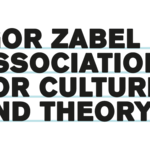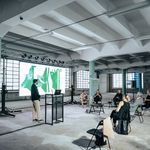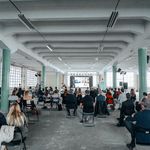A Letter to the Future / Towards Radical and Creative Ecologies

International Conference
A Letter to the Future / Towards Radical and Creative Ecologies
Part of the program of EKO 8, International Triennial of Art and Environment
Former MTT factory, Melje / Maribor, Slovenia & the World Wide Web
Saturday, 22 May 2021
guests: T. J. Demos, Maja and Reuben Fowkes, Elke Krasny, Andri Snær Magnason, Luka Omladič, Lucia Pietroiusti, and Marjetica Potrč
moderated by: Dražen Dragojević
organizers: Igor Zabel Association for Culture and Theory and Art Gallery Maribor
supported by: ERSTE Foundation
Emerging from the EKO 8 concept, the conference addresses environmental and climate urgencies as well as the potential of art to critically and creatively address and engage with them at the local and global level. In our search for radical and creative ecologies, we focus on contemporary artistic and curatorial strategies, looking at recent examples, and exploring the intersection of art, political ecology, environmental advocacy and activism, social and environmental justice, politics and theory of care, de-growth, and postcolonial globalization.
Zoom link to the conference: us02web.zoom.us/j/86140365371
The conference on the YT channel of the Igor Zabel Association: https://www.youtube.com/channel/UC-Iaohtpr3_eclHFLCJsEDg
In accordance with the PCT protocol, it will also be possible to watch the webcast of the conference program in the EKO 8 exhibition spaces.
Panel 1: Toward the Rights of Nature and Agency of Art in the Environmental Crisis
16:00 / Introduction by the organizers
Alessandro Vincentelli, EKO 8 curator
Urška Jurman, Igor Zabel Association
16:10 / Andri Snær Magnason: A Letter to the Future
During the next hundred years, we expect to see fundamental changes in all forms of water on our planet. Many glaciers will melt and sea levels will rise at a faster rate than has ever occurred before. Acidification will bring the oceans to a pH level not seen in thirty million years. Patterns of rain and snow will change dramatically in most areas of the planet. We could say that nature is no longer changing at geological speed but has now accelerated to human speed. This extreme shift is greater than any metaphor, words, or language that we know. Just as the immense gravity of a black hole makes it invisible, we can now say that the phenomena described above are so massive that they swallow all words and their meanings. We hear phrases such as “climate change” but they are white noise for most people, ninety-nine percent of their actual meaning being beyond the limits of our imagination. In order to describe a black hole, we have to look at the surrounding galaxies, and, likewise to understand these phenomena, we have to look beyond the data, to the role of art and artists to generate new means of expression. How do we talk about something larger than language? How do we talk about issues where the words we use are new and unfamiliar? Such as “ocean acidification”, one of the most significant phrases in human history, and yet too new and ambiguous for most of us to understand? How long does it take for words to become fully loaded? Will we be able to understand these words before it is too late?
16:30 / Marjetica Potrč: From Water to Nature – The Rights of Nature in Slovenia
In 2016, the Republic of Slovenia added access to drinkable water to its constitution as a fundamental right, declaring that water resources are “a public good managed by the state” and “not a market commodity”. Slovenia was the first country in the European Union to include the right to water in its constitution, a move that was enthusiastically supported by the public.
Today, five years later, water has become an endangered resource in Slovenia, as is evidenced by a law recently proposed by the current government and passed in the parliament. Since the law is clearly in conflict with the constitutional right to drinking water, we must ask if Slovenia is in conflict with itself: the constitutional right versus the new law translates into Us versus Us. Drinking water is a common good, and when mismanaged, becomes a common misfortune. The present controversy shows the difficulty Slovenians face when addressing their relationship with nature. Is nature an object that we use (and abuse) or a subject with which we share the planet and that we are in fact a part of? This is the question raised by the Anthropocene paradigm. Even we still have to fight for the right to drinking water, is it time to move from the human-centred position that gives people the right to use water to a position that acknowledges and stands up for the Rights of Nature as a subject?
Potrč will link her presentation to a project she is currently working on for the 23rd Biennale in Sydney that focuses on the Rights of Nature and two case studies – the Soča River in Slovenia and the Lachlan River in Australia.
16:50 / Luka Omladič: Is there an Ethical Imperative for Art in Response to the Environmental Crisis?
With the scientific discovery of anthropogenic climate change and its causes, the question of moral obligation in relation to the environmental crisis has begun to be posed in the context of scientific ethics. It is not the first time: in the modern era, science had to confront its own ethical involvement in the ultimate crisis that could potentially bring about “the end of the world as we know it”, the discovery – and then the use – of the atomic bomb. The Enlightenment context of science as an a priori instrument of the progress of humanity was coupled with the post-atomic ethical context of hypothetical responsibility for the catastrophe of humanity.
The atomic bomb – a scientific discovery that humanity must not use – and global warming – a scientific discovery that humanity must use – places science at a particular intersection of politics and epistemology. “Listen to the science,” – the imperative of Greta Thunberg – is the fundamental motto of the global climate movement, which also asks the question: is the scientist, taking into account the implications of his/her discoveries, inherently an activist? It seems that the classic imperative of the ethics of science – unconditionally pursue the discovery of the truth – can no longer avoid the political context.
Has the environmental crisis also placed art in a similar situation as regards new ethical obligations? Does this signal a historical process in which we might perceive a new historical form of art: art in the age of environmental collapse?
17:10–17:50 / Discussion
The conversation between Andri Snær Magnason, Marjetica Potrč, and Luka Omladič, moderated by Dražen Dragojević.
PANEL 2: TOWARD ECOLOGIES OF ART AND CURATING
19:00 / T. J. Demos: Toward Radical and Creative Ecologies
In the presentation, I will discuss ways of defining the conference’s key terms: radical, creative, and ecologies. Drawing on my ongoing research, I will propose new ways of imagining and understanding the convergence of these concerns in future-oriented artistic and activist practices. I will also discuss the following questions: what are the characteristics of emerging environmental arts? What is the political aspect of creative ecologies and the imaginative aspect of radical ecologies? How can creative ecologies raise environmental awareness, transform established values, build alliances across sectors, and inspire social movements? What ideas and strategies are artists and activists proposing or practicing in order to create a more just-caring-viable planetarity?
19:20 / Maja and Reuben Fowkes: In Defence of the Unprotectable – Ceremonies for Postglacial Futures
Dramatic changes to the cryosphere, the cold part of the planet where water is frozen into ice or snow, are accelerating at an unprecedented rate because of global warming. The reality of global warming is evidenced by the fact that nineteen of the hottest years ever registered have occurred in the new millennium. The gathering speed of polar ice sheet melt and the global retreat of permafrost are a unifying experience for the generations living on the planet, and a predicament addressed by artists through works that internalize ice loss, consider glacial agency, recreate the mythology and memory of polar ice, as well as take a stand for the rights of glaciers. What are the implications of the shrinking of the cryosphere and the extinction of permafrost for planetary natures and cultures, how can the loss of the richness of polar and alpine ice worlds be processed, and why should we still mobilize to Stop the Thaw?
19:40 / Lucia Pietroiusti: Art for Deep Time? An Ecological Proposition
How do we know and remember more-than-human interrelations and our planetary responsibilities? How do we carry learning through deep time? Reflecting on art as ritual and ritual as knowledge, Lucia Pietroiusti will introduce a few current and recent projects that address very different, possible avenues of artistic and curatorial agency toward environmental justice and balance, such as the Back to Earth programme at Serpentine in London (2020-ongoing) – that invites artists, architects, poets, filmmakers, scientists, thinkers, and designers to devise artist-led campaigns, protocols, and initiatives that respond to the environmental crisis – and Sun & Sea, an opera-performance by Rugilė Barzdžiukaitė, Vaiva Grainytė, and Lina Lapelytė, that Pietroiusti curated for the Lithuanian Pavilion at the Venice Biennale in 2019 (currently touring).
20:00 / Elke Krasny: Ecologies of Curating
The risk of global catastrophe and the intensification of inequality characterize the conditions of living with a broken and infected planet. More than ever, curating is challenged with developing new modes of practice that will enable meaningful social and environmental encounters and create lasting and transformative relations. What are the examples for this? How do we avoid greenwashing and carewashing, and instead establish meaningful and effective ecologies of curating? What do we need to make that happen? Elke Krasny will present the outcomes of the Ecologies of Curating collective workshop that was organized as part of EKO 8.
20:20–21:00 / Discussion
The conversation between T. J. Demos, Maja and Reuben Fowkes, Lucia Pietroiusti, and Elke Krasny, moderated by Dražen Dragojević.
The partner of the event is the Igor Zabel Association for Culture and Theory, which was founded in 2008 by members of the Zabel family and the ERSTE Foundation.



